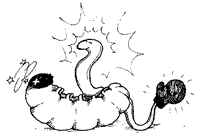Control Armyworm Using No Pesticides
While not terribly practical for most us, try poultry. Chickens, if you have them or can borrow them, will clean out a armyworm infestation in a matter of days. Once they've finished the job, dethatch and water the lawn thoroughly. It should recover in a matter of a week or two.
Strategy To Deal With Armyworm
Usually you don't even know you have a problem until you see the symptoms. Once you know you have armyworm there are two natural insecticides that work. AsaMax will cause the armyworm to stop eating and die. The Spinosad is made up of billions of beneficial microbes looking to be eaten so they can kill the armyworm. Both insecticides do not kill on contact; the bad guy has to eat some leaves with the product on them. That is why all other beneficial insects in the lawn are safe.
Predatory Nematodes are very effective but we suggest use them for smaller lawns under a quarter of an acre because of cost. Milky spore disease, another microbial product takes 3 to 4 years to be established but then you have no armyworm problem for at least ten years.
AzaMax will control the lawn armyworm
AzaMax is a natural product with a broad spectrum of pest control and broad plant applications. AzaMax is an anti-feedant and insect growth regulator which control (kills) pests through starvation and growth disruption within two or three days. Therefore this product is used when the bugger is chomping on the foliage. Any of the sprayers can be used to apply AzaMax
For more information about AzaMax go to the Yardener's Tool Shed; click here
For best results, mow the lawn before spraying it with AzaMax. Delay mowing as long as possible after spraying so that the material is available on the grass blades for the each hatch of new caterpillars. To help the AzaMax stick to the grass mix a surfactant or "spreader sticker" in the sprayer with the insecticide. A surfactant also helps the AzaMax penetrate the layer of thatch. armyworm caterpillars infected with AzaMax will stop eating and then die after 3 to 5 days.
Spinosad Is New and Will Control armyworm
Spinosad is an organic microbial active ingredient, produced by fermentation. Spinosad must be ingested by the insect because it is chomping on a leaf, therefore it has little effect on sucking insects and non-target predatory insects. Spinosad is relatively fast acting. The pest insect dies within 1 to 2 days after ingesting the active ingredient. Spinosad will not persist in the environment. Sunlight and soil microbes break it down into carbon, hydrogen, oxygen and nitrogen. Listed for use in organic production. For more information about using Sinosad, go to Yardener's Tool Shed; click here.
Predatory Nematodes
The fastest control of armyworms is achieved with beneficial (predatory) nematodes. Since they are relatively expensive, they are most suitable for small areas. However, they are effective in 5 to 7 days in most cases. These microscopic worms are packaged as a powder and are activated by adding water. Spray the liquid slurry on infested turf in the late afternoon or early evening. The beneficial nematodes find their way to armyworms, burrow inside them, and reproduce. They bring in bacteria, which kill the armyworms within a few days.
Nematodes can reduce a population of armyworms by up to 80 percent within two to four days.
|
|
However, conditions in the soil, the age of the nematodes, and the application effectiveness may contribute to delays in final results. Since the nematodes travel on a thin film of water through the turf, it is important to soak the lawn with 1/2 inch of water before applying them and again afterward. Read the package label carefully and follow the instructions. It costs roughly $60 to treat 1000 square feet of lawn with predatory nematodes.
See Yardener's Tool Shed for sources. Check out commercial Predatory Nematodes in the Beneficial Insects section.
Milky Spore Disease Works On Armyworm


